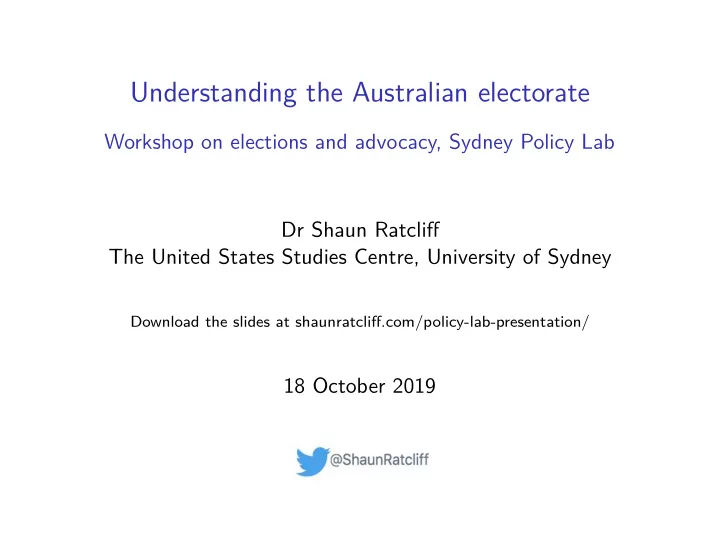

Understanding the Australian electorate Workshop on elections and advocacy, Sydney Policy Lab Dr Shaun Ratcliff The United States Studies Centre, University of Sydney Download the slides at shaunratcliff.com/policy-lab-presentation/ 18 October 2019
Some questionable narratives have emerged around the 2019 election.
Battlers. The working class. Quiet Australians.
Mistaken ideas of economic interests (what is a ‘battler’?), ecological fallacies and problematic inferences leads to a few issues: ◮ Who actually voted for the Coalition, Labor?
Mistaken ideas of economic interests (what is a ‘battler’?), ecological fallacies and problematic inferences leads to a few issues: ◮ Who actually voted for the Coalition, Labor? ◮ Did the voters who might benefit from Labors’ policies vote for the Coalition?
Mistaken ideas of economic interests (what is a ‘battler’?), ecological fallacies and problematic inferences leads to a few issues: ◮ Who actually voted for the Coalition, Labor? ◮ Did the voters who might benefit from Labors’ policies vote for the Coalition? ◮ What lessons should we (and the parties) take from the election?
Labor two−party swing by income and state QLD SA NSW 4% 2% 0% −2% −4% Labor two−party swing WA TAS ACT 4% 2% 0% −2% −4% $50,000 $100,000 $150,000 $50,000 $100,000 $150,000 VIC 4% 2% 0% −2% −4% $50,000 $100,000 $150,000 Median household income Two−party is Labor−Coalition two−party estimate for all electorates, including those that were not Labor vs Coalition.
Labor first preference swing by income and state ACT QLD TAS 4% 2% 0% −2% −4% Labor first preference swing WA VIC NSW 4% 2% 0% −2% −4% $50,000 $100,000 $150,000 $50,000 $100,000 $150,000 SA 4% 2% 0% −2% −4% $50,000 $100,000 $150,000 Median household income
Ecological fallacies.
Understanding public opinion.
Primary vote share 30% 40% 50% No assets Owns home Coalition Primary vote by asset ownership Shares Business or trust Assets owned Other real estate No assets Owns home Australian Cooperative Election Survey Labor Shares Business or trust Other real estate
Primary vote by household income Coalition Labor Primary vote share 40% 30% < $52k $52−$78k $78−$156k > $156k < $52k $52−$78k $78−$156k > $156k Household income Australian Cooperative Election Survey
Primary vote share 30% 40% Disability Youth & student Family Primary vote by government payments Coalition Other Carer None Payments received Age Disability Youth & student Family Australian Cooperative Election Survey Labor Other Carer None Age
The role of Labor policy: negative gearing.
Primary vote share 20% 40% 60% No assets Owns home Agree Shares Attitudes towards negative gearing Business or trust Other real estate by asset ownership No assets Assets owned Owns home Neutral Shares Business or trust Other real estate Australian Cooperative Election Survey No assets Owns home Disagree Shares Business or trust Other real estate
Attitudes towards negative gearing by household income Agree Neutral Disagree Proportion with each response 50% 35% 20% < $52k $52−$78k $78−$156k > $156k < $52k $52−$78k $78−$156k > $156k < $52k $52−$78k $78−$156k > $156k Household income Australian Cooperative Election Survey
Support for negative gearing by home ownership and income Agree Neither agree nor disagree Disagree Proportion providing each response 50% 30% 10% $50 $150 $250 $50 $150 $250 $50 $150 $250 Annual household income ($,000s) Owns home (including with mortgage) Other voters Australian Cooperative Election Survey
Who changed their vote?
Who left Labor? < $52,000 $52,000 to $77,999 $78,000 to $155,999 > $156,000 20% Rate of defection 10% 0% Coalition Greens Other Coalition Greens Other Coalition Greens Other Coalition Greens Other Vote in 2019 Australian Cooperative Election Survey
Who came to Labor? < $52,000 $52,000 to $77,999 $78,000 to $155,999 > $156,000 20% Rate of arrivals 10% Coalition Other Greens Coalition Other Greens Coalition Other Greens Coalition Other Greens Vote in 2016 Australian Cooperative Election Survey
And the Coalition?
Who left the Coalition? < $52,000 $52,000 to $77,999 $78,000 to $155,999 > $156,000 16% Rate of defection 10% 4% Labor Greens Other Labor Greens Other Labor Greens Other Labor Greens Other Vote in 2019 Australian Cooperative Election Survey
Who came to the Coalition? < $52,000 $52,000 to $77,999 $78,000 to $155,999 > $156,000 20% Rate of arrivals 10% 0% Other Labor Greens Other Labor Greens Other Labor Greens Other Labor Greens Vote in 2016 Australian Cooperative Election Survey
The role of attitudes towards negative gearing in partisan defections.
Who left Labor? Support for negative gearing use by landlords Agree Neutral Disagree 10% Rate of defection 6% Coalition Greens Other Coalition Greens Other Coalition Greens Other Vote in 2019 Australian Cooperative Election Survey
Who left the Coalition? Support for negative gearing use by landlords Agree Neutral Disagree 20% Rate of defection 10% 0% Labor Greens Other Labor Greens Other Labor Greens Other Vote in 2019 Australian Cooperative Election Survey
What happened? ◮ Loss aversion? People tend to prefer avoiding losses to acquiring equivalent gains.
What happened? ◮ Loss aversion? People tend to prefer avoiding losses to acquiring equivalent gains. ◮ Complexity of policy. The only people that understood it were those that benefitted from the status quo.
What happened? ◮ Loss aversion? People tend to prefer avoiding losses to acquiring equivalent gains. ◮ Complexity of policy. The only people that understood it were those that benefitted from the status quo. ◮ Politics is about emotion and values, not technical policy.
Recommend
More recommend